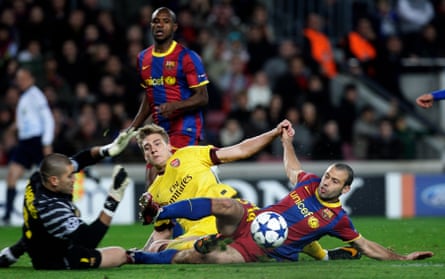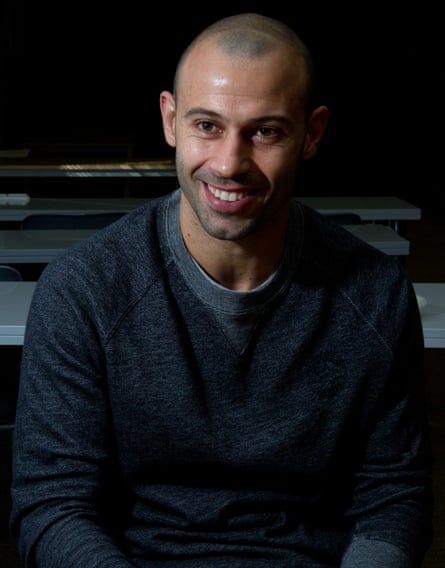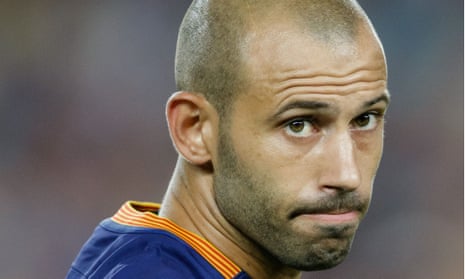Javier Mascherano has a confession to make: Nicklas Bendtner changed his life. It was March 2011, the Argentinian’s first season at the Camp Nou and he feared that it might also be his last. Barcelona were leading Arsenal 4-3 on aggregate in the second leg of the Champions League last-16, the same stage at which they meet on Tuesday, the clock showed 90 minutes and Barça were going through. Then, suddenly, unexpectedly, they found themselves watching in horror as it threatened to slip through their fingers.
Arsenal had not had a shot on target when Jack Wilshere put Bendtner one-on-one with Víctor Valdés. Score and somehow Arsenal would go through; Barcelona would be out. Bendtner took a touch, a little wide, and from nowhere a figure slid past and took the ball from him. Mascherano made the tackle, Arsenal went home, Barcelona went on to win the European Cup and he constructed a career in Catalonia. Had Bendtner scored, it might have ended there. As he puts it: “That tackle marked a before and after.”
Mascherano leans forward in his chair at Barcelona’s San Joan Despí training ground. “Honestly,” he says, “after five, six months I thought it was unlikely I’d be here long: my characteristics seemed to go against everything Barcelona stood for. That moment marked me. If Bendtner had controlled the ball and gone the other way, he’d have got away from me and … uffff! … I don’t know what would’ve happened. But it happened the way it happened and we ended up winning that Champions League. Things worked out well.”
Well? Mascherano has won 13 titles at Barcelona, including three leagues, two Champions Leagues and two Club World Cups. He has been an undisputed starter through five years of success, playing 265 games – as a central defender. Never mind that he played in midfield in the 2014 World Cup final, was many people’s player of the tournament and that Roy Hodgson voted for him as the Ballon d’Or that year; or the €22m Barcelona paid for him when he was an established midfielder, not some unknown kid. The way Mascherano tells it, it had to be that way.
“I’ve always refused to give up. You think: ‘If I’m not playing at West Ham, how am I going to play for Liverpool when they already have Gerrard and Xabi Alonso?’ But I took that as a challenge and it was the same when I joined Barcelona. But it was hard and [by then] I knew I wouldn’t take Sergio Busquets’ place. Impossible, impossible. Think of another player anywhere who could do what Busquets does for this team … there isn’t one. It was hard to see myself having a long stay here.”

That night, though, something shifted. Mascherano’s position, in particular. If he could not take Busquets’ place, he would have to take a place somewhere else. He had never imagined himself as a defender – “No, no, no, I had no idea” – but changing position changed everything.
“I actually played that game in midfield; it was Busquets who played at centre-back,” he recalls. “But from then on, I played at centre-back: that tackle changed everything. I found my position and I’ve been there all these years, trying to keep my place and keep this level. Until when? I don’t know because Barcelona demand a lot and have the possibility to sign whoever they want.”
The search for a centre-back remains a constant but so does he. Mascherano embraced the change. He says he had not looked for a way out; it is more that he wondered if they might look for one on his behalf. “After all,” he insists, “where do you go from here? It was worth it because I’m playing for one of the best teams in the world, with the chance to win titles. And I see football as a collective sport, not an individual one.
“I like talking about football,” Mascherano adds. For an interviewer, it is the perfect introduction. It is also quickly apparent. He is eloquent, intelligent, analytical and convincing. He likes talking about football, all right; just as importantly, he likes to listen. There is depth to what he says, openness too and he offers up lessons learned. It is easy to see how he adapted where others might not, to spot both the humility that helped him integrate and the leadership that had already earned him the nickname Jefecito – “Little Chief” – to understand why team-mates insist he is the future manager in this team.
So, a quick detour: is he? “Playing at coach is very easy, actually doing it is another thing: put yourself in the coach’s position and you’ll see how complex everything is,” he says. “But I’d like to try. If you’re going to do something, you need to prepare properly, and I will prepare myself. Then I’ll see if I can take the next step.” Where? At a small club? “Me? I’d start in Argentina, for sure.” And then Europe? “Well,” he says. “I don’t know about that; I don’t know if I’d have what it takes.”
He did not know if he had what it took here, either, but he did have. Mascherano talks about relearning football; the complete contrast between his qualities and Barcelona’s; the obligation to be a different type of player, breaking from the destructive role he had always fulfilled to construct at a club that always attacks. He talks about Andrés Iniesta dribbling on the edge of the area, wondering to himself: “How can he do that so calmly?” and about the realisation that “what I’d always done wasn’t enough”, the need to improve dramatically to bridge a technical gulf between him and others that was “too noticeable”.
But he did adapt. Elsewhere, the shift in position might not have resolved some of those issues, it might have just sunk him. But at Barcelona it did. The same stylistic difficulties that made settling into midfield harder made the conversion to the defence smoother.
“Being a centre-back for Barça is not like being a centre-back for any other team,” he explains. “The areas you inhabit are very similar to those I’d inhabit playing in midfield. Often, in terms of where we press, Busquets and I are practically in the same line. If you make me defend in my area the whole time, then obviously I’m going to suffer because of my physical stature, but we don’t. The [biggest] thing that changes is that I receive the ball facing the pitch, not with my back to the play.”
Mascherano once insisted that the 90 minutes are for suffering, all the more so as a defender, but now he says: “I enjoy it.” Time, then, to do away with the idea of Mascherano-the-makeshift-centre-back? Not exactly. Asked if it annoys him to be treated like a man out of position, a supposed weak line well into his sixth season, 13 trophies later, he responds: “No, because I still see myself as a midfielder.”
Still? “Still. Look, one day I won’t play for Barcelona. I’ll go and play somewhere else and I’m sure I’ll do so as a central midfielder. That’s what I’ll try to do, because it’s the position I like. Circumstance dictates and because of my desire to keep playing here I adapted. I like centre-back, but midfield is the position I chose to make my career.”
Where then? What if Pep Guardiola calls, for example? “Pep’s not going to call me,” Mascherano laughs. “He won’t call. No, no, no.” A return to the Premier League is possible, though. He clearly enjoyed it, after all: he talks fondly of Anfield and even feeding the ducks in Sefton Park, while however good this Barcelona midfield is – so good he could not get into it – he hesitates when asked if Busquets-Iniesta-Xavi was better than Mascherano-Gerrard-Alonso. “We had a good time and played some very good football,” he smiles. “Supporters still remind me of it.”

Nor would that Liverpool connection preclude a move elsewhere. “My feelings for Liverpool don’t mean I’m tied to them. I have a lot of affection for them and always will have, but if in the future a Premier League team gave me a chance, you can’t say: ‘No, I’d only play for one team,’” he says. “We’re professionals, this is our living. Whatever happens, my feelings for Liverpool won’t change.
“Liverpool were one of the best teams I played for [but] the club had problems. I never met the owners. Liverpool’s a club to enjoy, to be there, to live. It’s not worth owning Liverpool 20,000km away; it belongs to the people and you don’t get that if you’re never there. It’s a pity. I always felt the club was trying to take a step forward but couldn’t. Now with Klopp they’re trying. He’s a manager for Liverpool – very much of the people. Nowhere has anybody treated me so well. I was sad that I had to go the way I did.”
Why then? “What happened is what had to happen. They promised me that if there was a good offer they’d release me because the club was in a process of disintegration.But [then the club] didn’t always tell the truth; it’s the player whose image gets damaged, the same happened to Fernando [Torres], but things were clear: I never lied. When Rafa [Benítez] went, they knew I’d leave. I felt the project was falling apart. Rafa had gone, there was no direction.” He pauses. “And the offer was Barcelona.”
Thirteen trophies, a treble last season, and maybe another this season. A place in the Copa del Rey final, a six-point lead in the league, and now Arsenal in the last 16, memories of the day it all changed for him; memories of frustration for Arsenal – that familiar hurdle at which they always fall. Not always, Mascherano counters, interrupting in defence of Arsène Wenger: “He’s got them further.”
He is as quick to defend Alexis Sánchez, one of many excellent players who perhaps was not quite himself at Barcelona, unable to adapt as Mascherano did, and finding his best form consistently only in his final season, but in whom Mascherano sees a touch of Luis Suárez.
“Yes, totally,” he says. “Alexis is a fighter who never gives up a ball for lost. Regardless of how well he plays, he always gives everything. That’s fundamental: he plays a huge role for them, transcendental. His aggression and attitude is infectious. He transmits so much. And I think he did deliver here: he was very involved. Maybe he needed the challenge of a greater part elsewhere; you can understand that. But he gave us a lot.
“Arsenal have always competed, consistently – even [back] when each year they lost important players and had to rebuild. In the last two seasons, they’ve raised their competitive level,” Mascherano continues. “Mesut Özil’s vital: you notice more and more that everything revolves around him. And their midfield, when everyone’s fit, has lots of quality: Coquelin, Cazorla, Ramsey are players you have to be very aware of. They’ll be difficult: they want the ball and want to attack. They won’t change because it’s Barcelona. They’ll attack us and I think that deserves praise.”

There may be a glimmer of hope for Arsenal, too. Barcelona travelled to Japan for the World Club Cup, which they won on 20 December. Since then, they have played 16 times. “Not even having three days off takes its toll,” Mascherano admits. “It’s not an excuse; it’s what we have to do, but we’re not machines. Maybe the freshness to get the ball back straight away has been lacking. It’s not the necessarily physical tiredness, often it’s mental tiredness, which provokes bad decisions; the pass you should have played there you put the other side and that has repercussions. It’s not so easy …” Mascherano laughs. “Well, for Messi it is … not for us normal players.”
The problem for Arsenal is that if Barcelona have occasionally looked vulnerable lately, difficult games interspersed with some mind-bendingly brilliant ones, Mascherano underlines the “competitiveness” that has seen them keep winning: they have gone 31 games unbeaten. A treble has not blunted their hunger. As the Atlético Madrid manager, Diego Simeone, insisted: even the front three do not seem to have much ego and that is rare.
“It’s not normal, and that’s why this team’s special,” Mascherano agrees. “After winning so much, this team goes on trying to feed itself. There are 25 of us and we don’t all think the same, we have different characters, but when you walk together everything’s easier. It’s not just the front three, but players like Busquets, Iniesta, Piqué, who’ve been winning all there is to win for years but still have desire. Home-grown players who transmit the team’s identity.”
Like Jamie Carragher and Gerrard at Liverpool? “Yes,” he says, “and the first thing you did when you arrived [each day] was see if they were there, but there were only two of them; here there are five, six, seven, eight. Even the tiniest praise weakens you, making you relax, so imagine not just the praise but reality: medals on the table. Yet they’ve marked out the route that the rest follow; they pass on the culture of the club.
“The secret isn’t those on the inside adapting to the players who arrive here; it’s the players who arrive here from the outside adapting to those on the inside.”

Comments (…)
Sign in or create your Guardian account to join the discussion